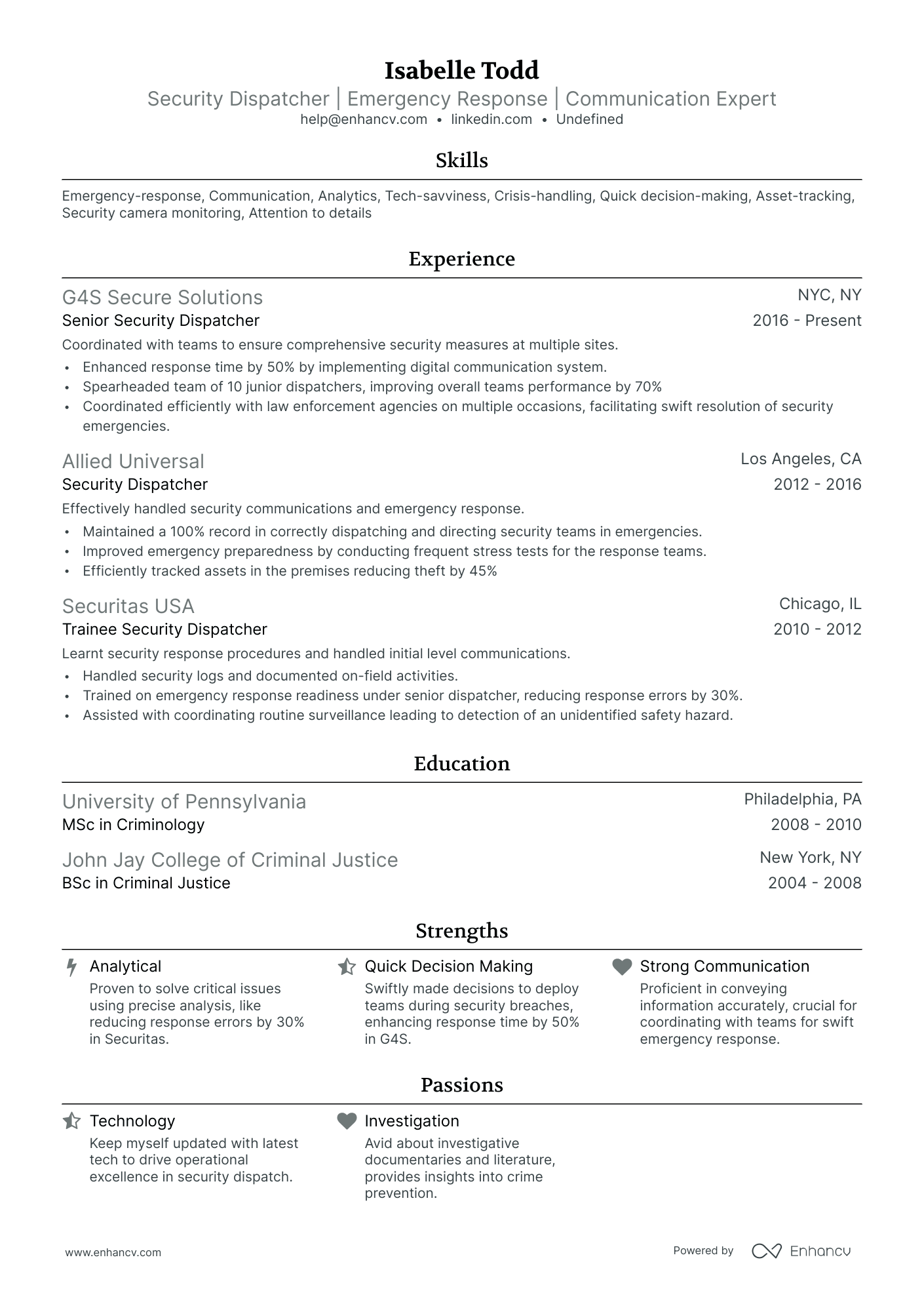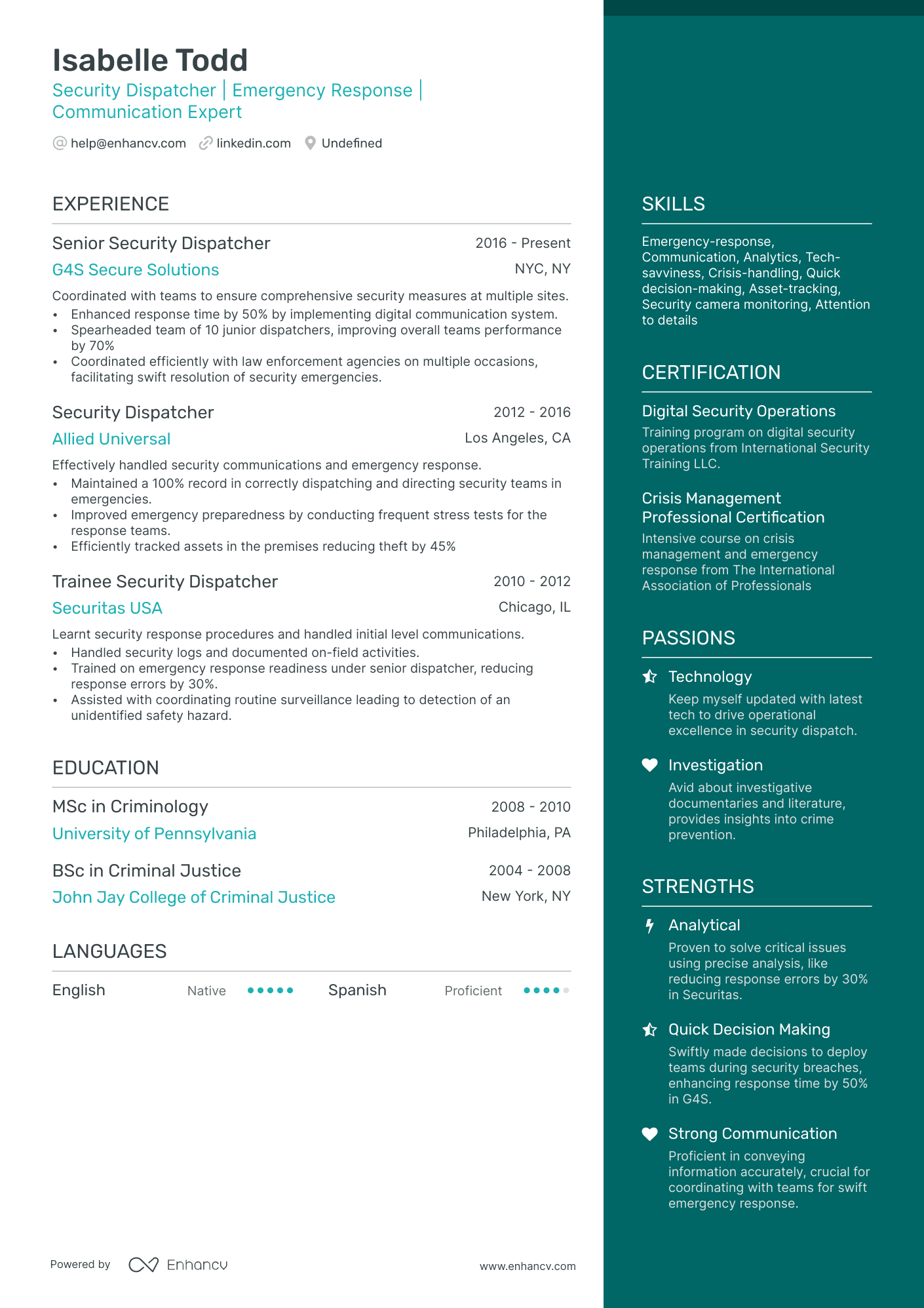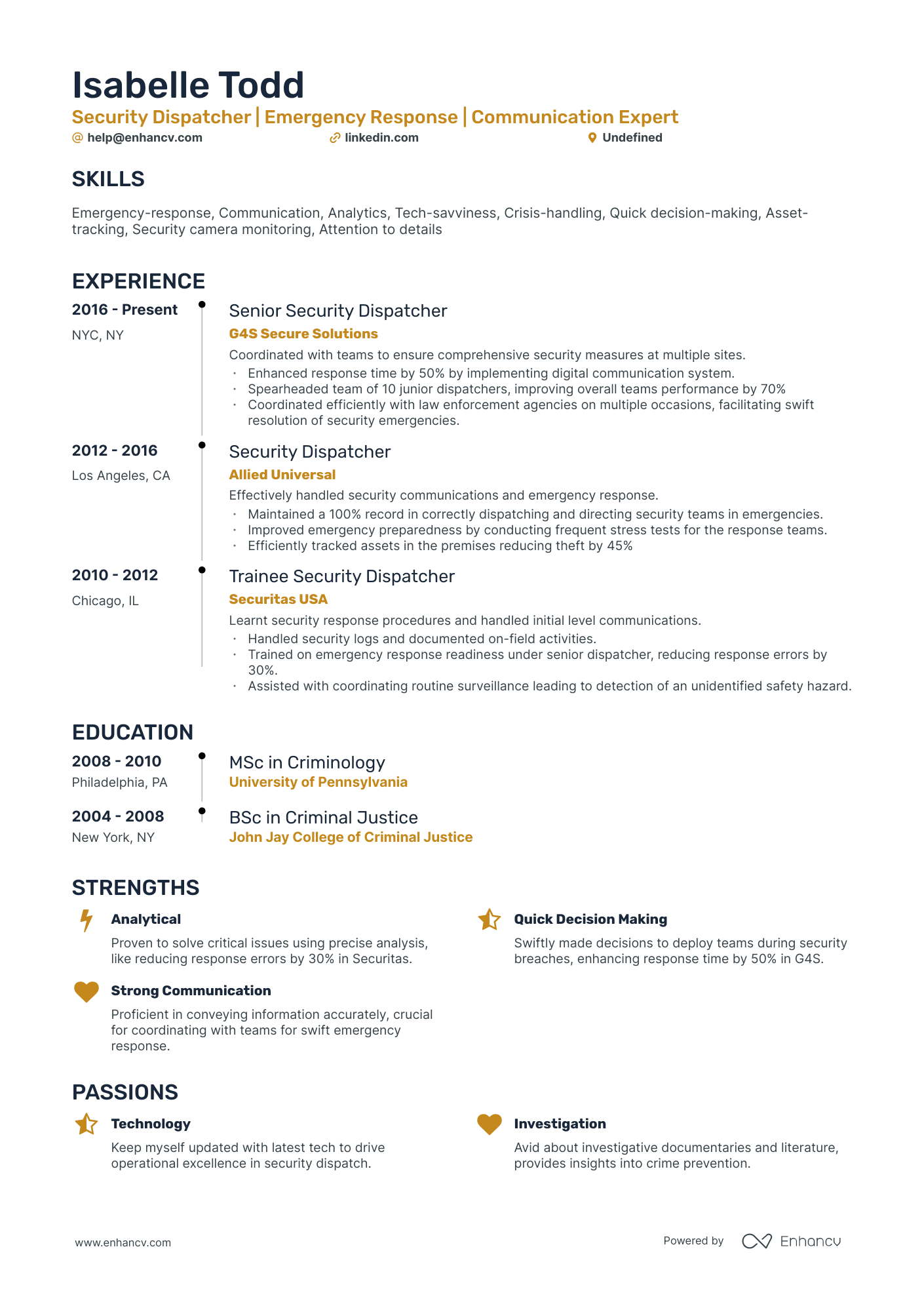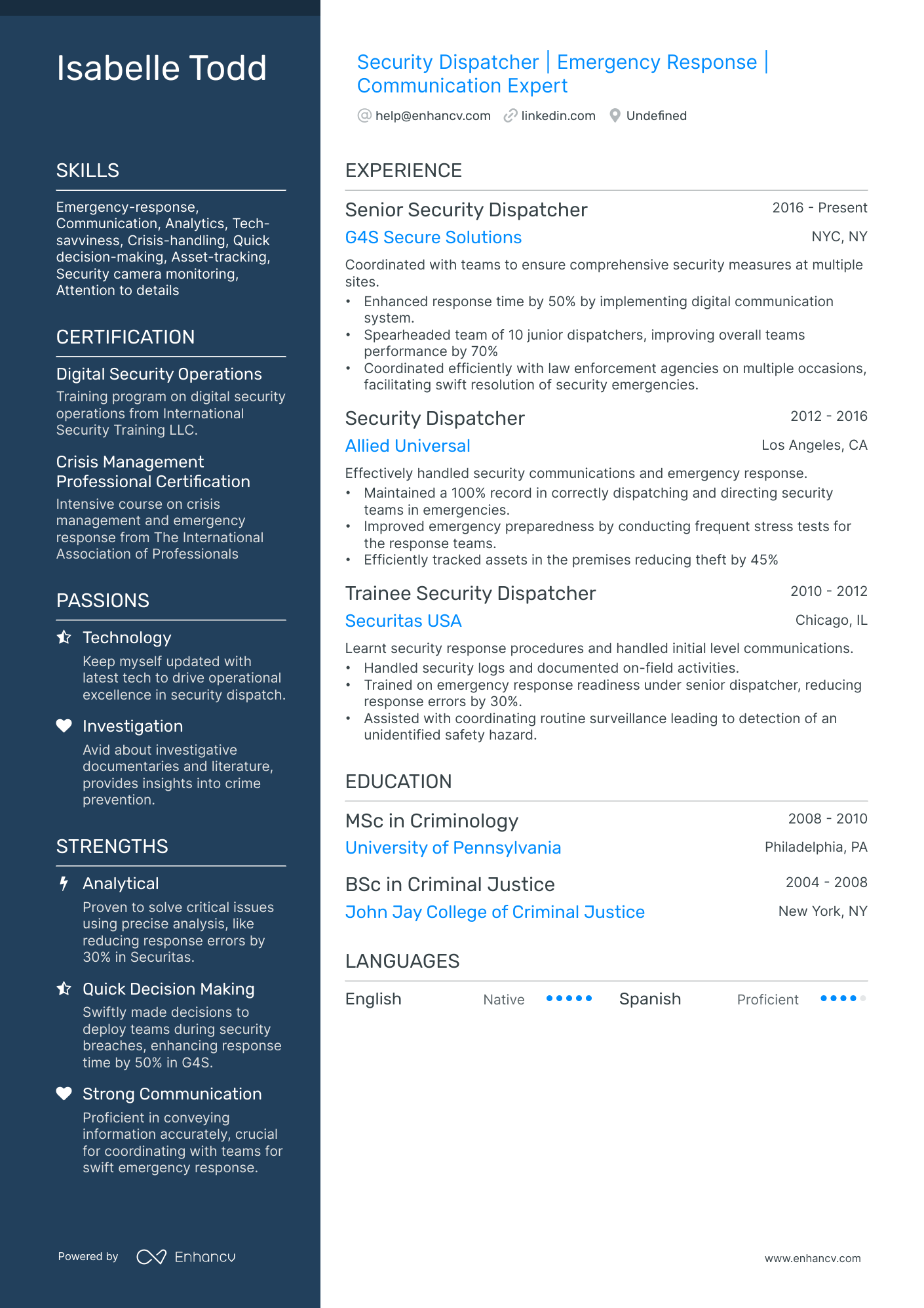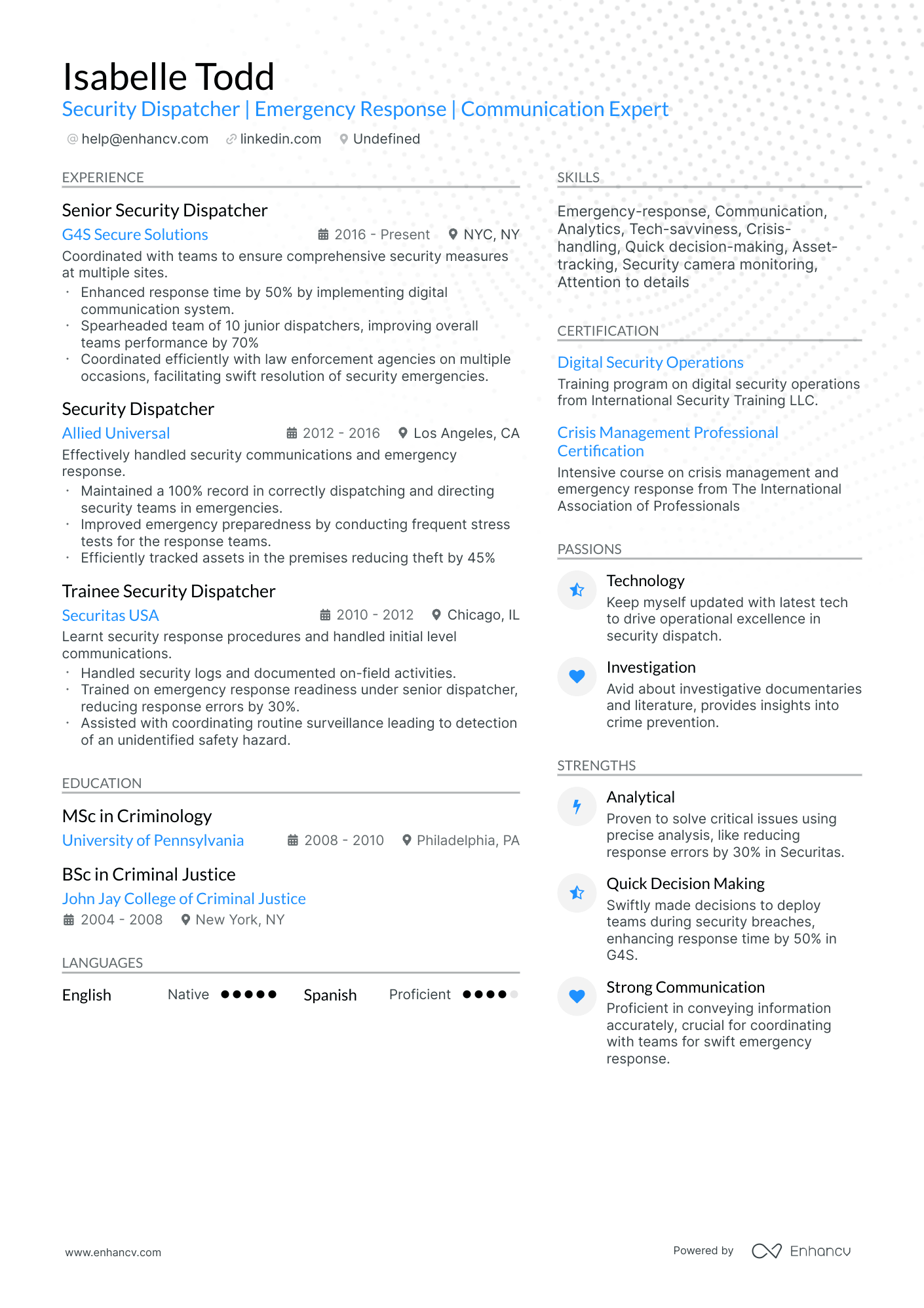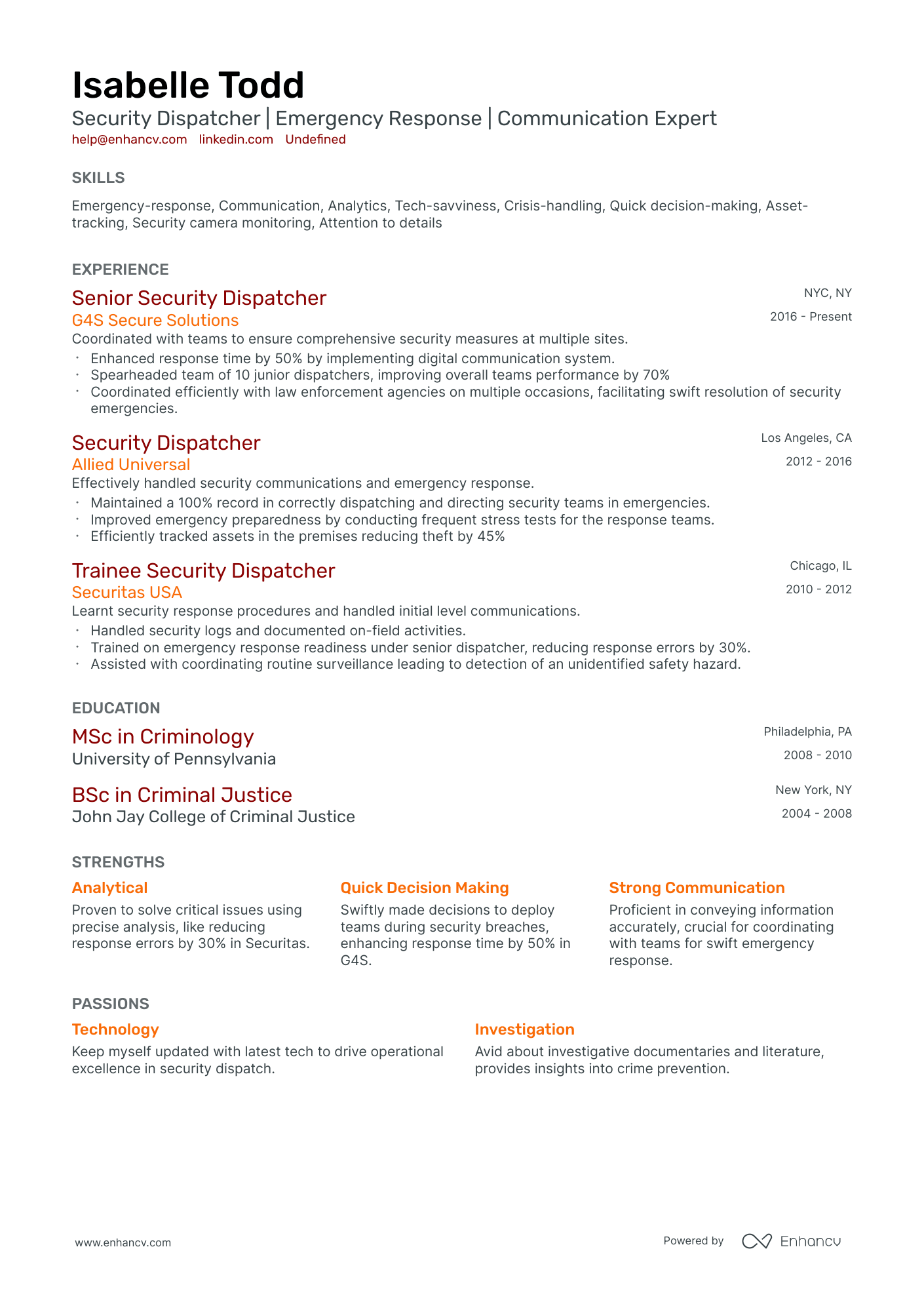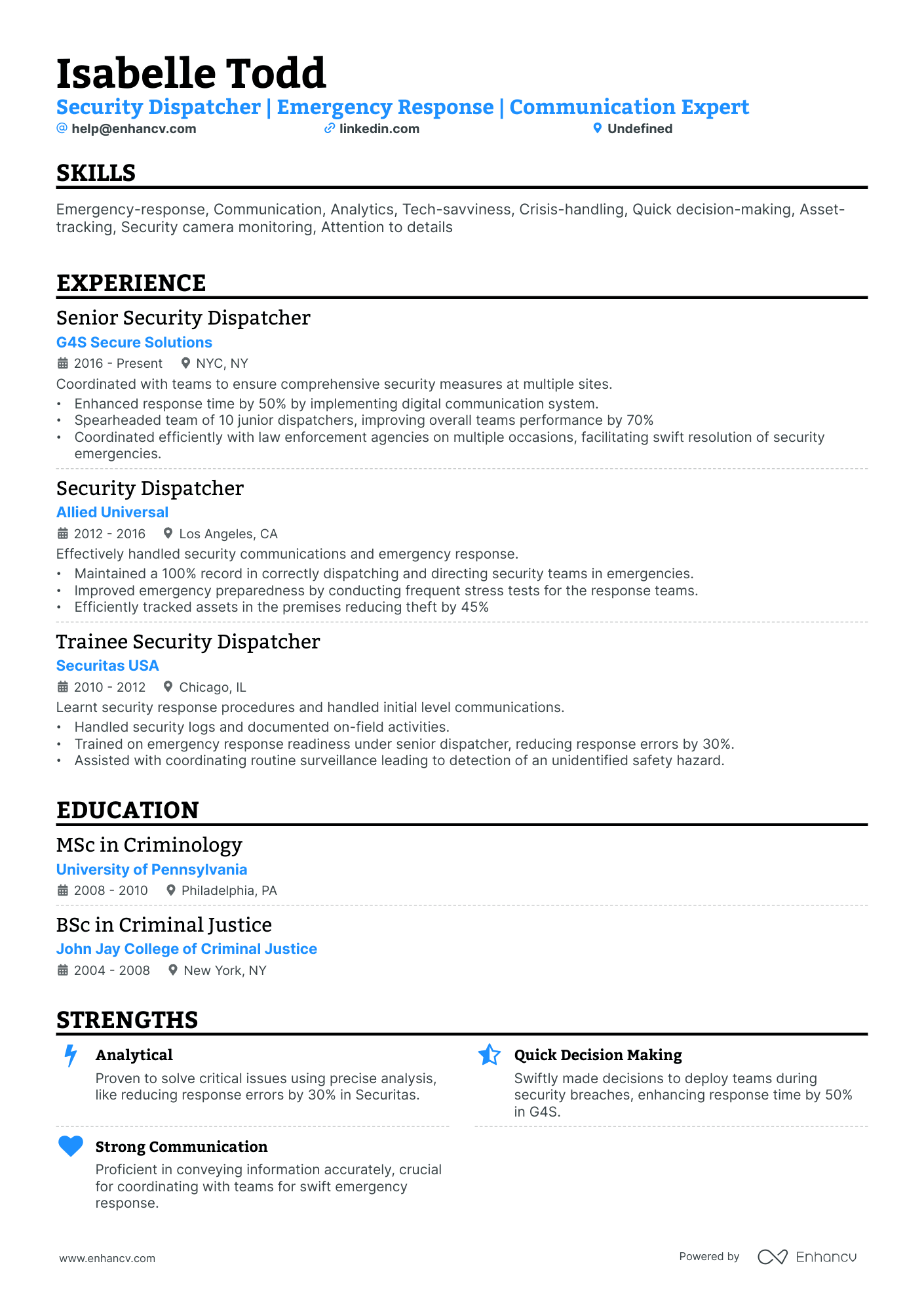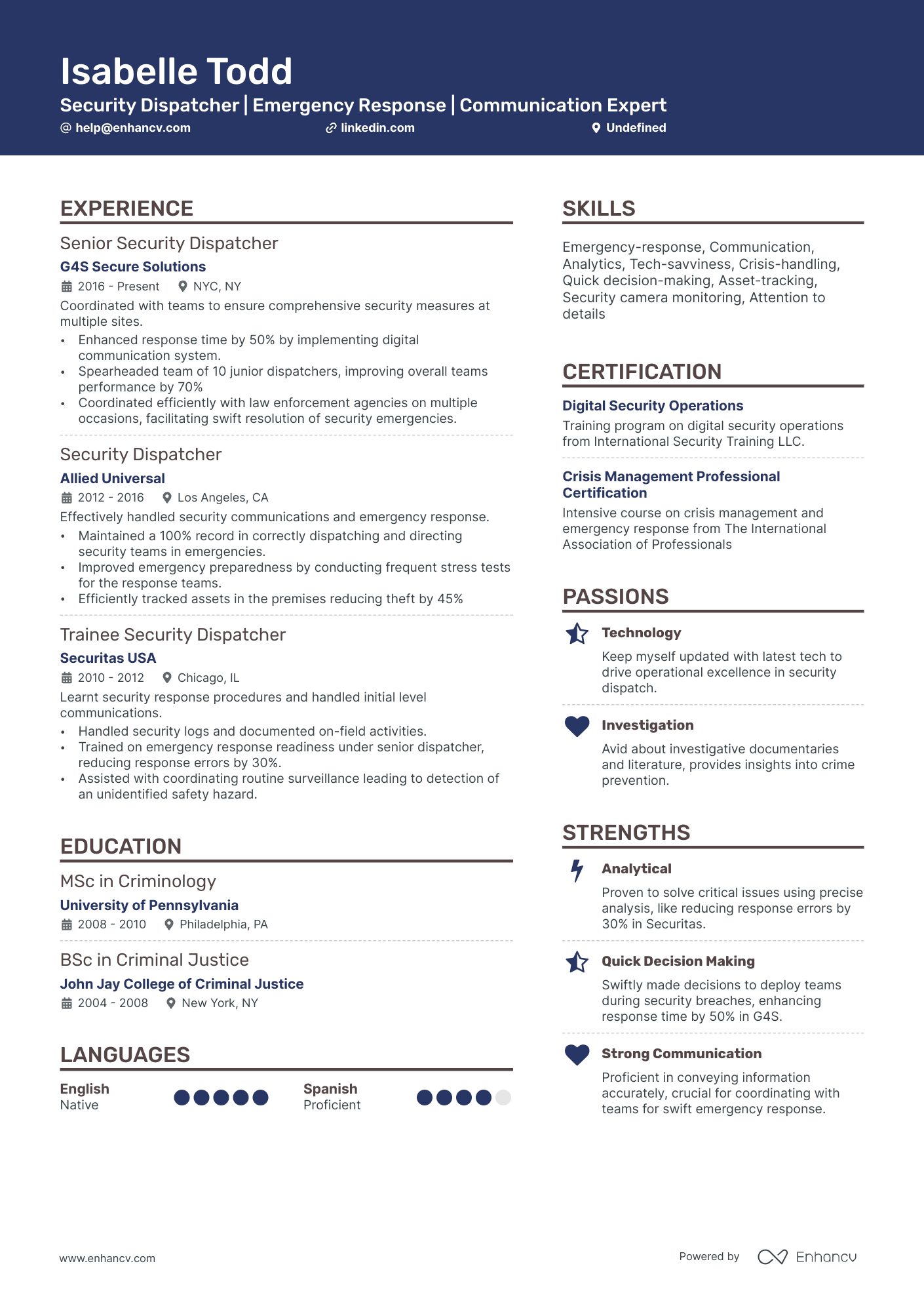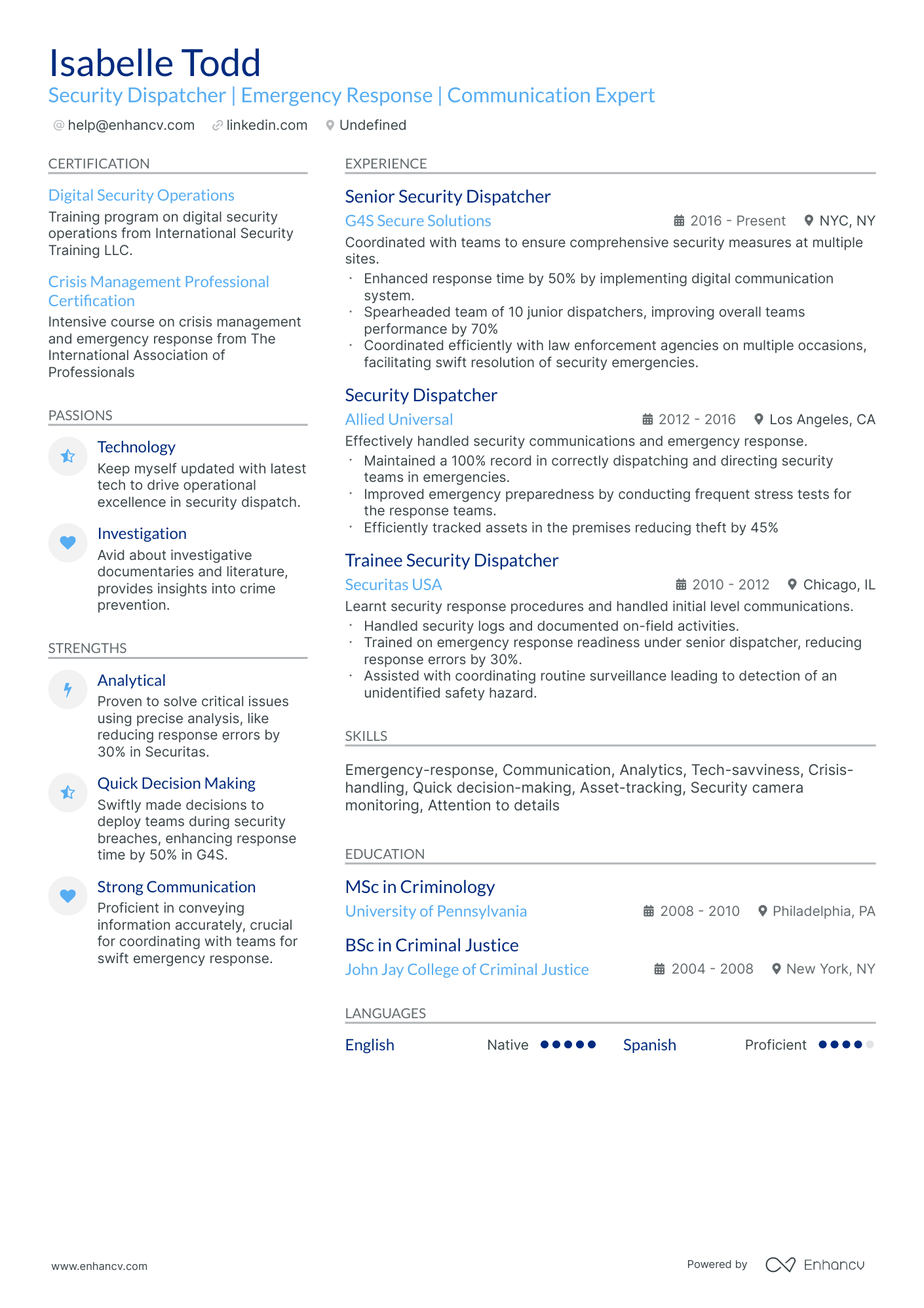A specific resume challenge faced by a security dispatcher may be effectively showcasing their ability to handle high-stress situations and make sound decisions quickly. Our guide can assist in addressing this challenge by providing tailored examples and action verbs, demonstrating how to highlight such crisis management skills in the work experience section of the resume.
Dive into this guide to uncover:
- Top-tier security dispatcher resume samples that have successfully landed candidates in leading companies.
- Strategies to direct recruiters' focus towards your standout experiences, notable achievements, and pivotal skills.
- Guidance on crafting resume sections that align closely with the vast majority of job specifications.
- Insights on harmonizing your security dispatcher technical prowess with your distinct personality, setting you apart from the competition.
Recommended reads:
Styling your security dispatcher resume: layout and format
Pondering the ideal length for your security dispatcher resume? Experts suggest keeping it between one and two pages. Opt for the two-page format if you boast over a decade of pertinent experience. Moreover, the resume format you choose is pivotal in showcasing your experience. Consider the:
- Reverse-chronological resume format to spotlight your career journey;
- Functional skill-based resume format if you're light on experience but want to emphasize skills;
- Hybrid resume format to provide recruiters a comprehensive view of both your experience and skills.
Here are some additional tips for your security dispatcher resume layout:
- Keep your headline straightforward: mention the job you're targeting, a notable certification abbreviation, or your professional specialty;
- Always customize your security dispatcher resume for the specific role, aligning job requirements with your experience in various resume sections;
- After finalizing your resume, save it as a PDF (unless instructed otherwise) to maintain its readability and layout consistency.
Consider the local standards – Canadian resumes, for example, may have a different format.
Upload your resume
Drop your resume here or choose a file. PDF & DOCX only. Max 2MB file size.
Pro tip
Prioritize clarity and organization in your security dispatcher resume. Use ample white space, choose readable fonts, and clearly delineate each section.
Must-have sections on a security dispatcher resume:
- A header to list your job title and contact information
- A resume summary or objective which highlights your top career achievements
- A detailed experience section where you emphasize the breadth of your expertise
- A skills box to put the spotlight on your social talents and technical strengths
- An education and certifications section which features your qualifications
What recruiters want to see on your resume:
- Experience in Security Dispatching: Prior work experience in a similar role demonstrates that you are familiar with the responsibilities of a security dispatcher and have honed your skills in a practical setting.
- Knowledge of Emergency Protocols: Understanding how to respond to emergencies is essential for this role. Hence, recruiters often prioritize knowledge of emergency response protocols and procedures.
- Proficiency in Communication Systems: Proficiency in using radio systems, telephones, dispatch equipment, and computer systems is crucial as these tools form the backbone of everyday operations in dispatch roles.
- Ability to Multitask: Dispatchers are frequently required to handle multiple tasks at once, so recruiters will seek candidates who can demonstrate this ability.
- Interpersonal and Communication Skills: As much of the job relies on communicating with officers, emergency services, and occasionally civilians, strong verbal and written communication skills are highly valued.
Recommended reads:
Decoding the security dispatcher resume experience section
Once you've settled on your resume's format, the next step is detailing your professional journey.
Many security dispatcher professionals grapple with this section, especially when balancing between extensive or limited experience. Here's a roadmap to navigate this:
- Limit bullet points under each job role to six, focusing on high-impact contributions.
- Highlight achievements that resonate with the job's requirements, rather than just listing duties.
- Detail any on-the-job certifications or skills acquired and their relevance to your growth.
- Choose impactful verbs for each bullet, avoiding overused terms like "managed".
- Infuse relevant keywords from the job posting, especially in the context of accomplishments.
For more insights, explore these curated examples from seasoned security dispatcher professionals:
- Managed security dispatch operations for XYZ Security Services, coordinating responses to over 500 incidents annually
- Implemented a streamlined communication system resulting in a 30% reduction in response time
- Collaborated with law enforcement agencies to investigate and resolve security breaches
- Trained and mentored new security dispatch personnel, ensuring efficient and effective team performance
- Coordinated emergency responses and dispatched security personnel for ABC Security Solutions
- Developed and maintained accurate incident logs, facilitating data analysis for process improvement
- Managed scheduling and shift assignments for a team of 15 security dispatch operators
- Implemented an automated incident tracking system resulting in a 20% increase in operational efficiency
- Responded to high-priority security incidents and dispatched appropriate personnel as a Security Dispatcher at DEF Protective Services
- Maintained constant communication with on-site security teams and clients, ensuring prompt resolution of issues
- Developed and updated emergency response protocols, enhancing overall preparedness
- Assisted in the implementation of a centralized dispatch system resulting in improved coordination and faster response times
- Monitored and dispatched security personnel in real-time for GHI Security Agency
- Documented incident details and generated comprehensive reports for management and clients
- Collaborated with security officers to ensure adherence to post orders and standard operating procedures
- Assisted in the development of training programs for new security dispatch personnel
- Provided operational support as a Security Dispatch Assistant at JKL Protection Services
- Maintained radio communication with security personnel, relaying important information promptly
- Performed data entry tasks, accurately documenting incidents and updating records
- Assisted in coordinating access control measures during special events and VIP visits
The following content includes information from "O*NET OnLine" by the U.S. Department of Labor, Employment and Training Administration (USDOL/ETA). Used under the CC BY 4.0 license. The data represents the top responsibilities present on the task lists for security dispatcher professionals.
Top Responsibilities for Security Dispatcher:
- Provide emergency medical instructions to callers.
- Question callers to determine their locations and the nature of their problems to determine type of response needed.
- Determine response requirements and relative priorities of situations, and dispatch units in accordance with established procedures.
- Receive incoming telephone or alarm system calls regarding emergency and non-emergency police and fire service, emergency ambulance service, information, and after-hours calls for departments within a city.
- Relay information and messages to and from emergency sites, to law enforcement agencies, and to all other individuals or groups requiring notification.
- Record details of calls, dispatches, and messages.
- Monitor various radio frequencies, such as those used by public works departments, school security, and civil defense, to stay apprised of developing situations.
- Read and effectively interpret small-scale maps and information from a computer screen to determine locations and provide directions.
- Maintain access to, and security of, highly sensitive materials.
- Enter, update, and retrieve information from teletype networks and computerized data systems regarding such things as wanted persons, stolen property, vehicle registration, and stolen vehicles.
Quantifying impact on your resume
```html
- Include the number of incoming calls received and dispatched per shift, illustrating your productivity and ability to handle high volumes of communication.
- Mention the number of emergency incidents you've handled, portraying your crisis management skills.
- Quantify the team size you have coordinated with, displaying your teamwork capabilities.
- Add the percentage reduction in response time achieved under your dispatching, demonstrating your efficiency and positive impact on operations.
- List the total number of training hours received in relevant areas (e.g., security protocols, dispatch software), showcasing your dedication to professional growth.
- Enumerate any improvements or cost savings in terms of percentage that resulted from process enhancements you suggested or implemented, emphasizing your initiative and strategic mindset.
- Showcase the number of safety and security breaches prevented under your watch, highlighting your vigilance and effectiveness in role.
- State the number of reports generated for management, implying your administrative skills and attention to detail.
```
Writing your security dispatcher experience section without any real-world experience
Professionals, lacking experience, here's how to kick-start your security dispatcher career:
- Substitute experience with relevant knowledge and skills, vital for the security dispatcher role
- Highlight any relevant certifications and education - to showcase that you have the relevant technical training for the job
- Definitely include a professional portfolio of your work so far that could include university projects or ones you've done in your free time
- Have a big focus on your transferable skills to answer what further value you'd bring about as a candidate for the security dispatcher job
- Include an objective to highlight how you see your professional growth, as part of the company
Recommended reads:
Pro tip
If your experience section doesn't directly address the job's requirements, think laterally. Highlight industry-relevant awards or positive feedback to underscore your potential.
Highlighting your security dispatcher skills
Recruiters look for a mix of technical and personal skills in your security dispatcher resume.
Technical or hard skills are specific tools or software you use for the job. They're easy to spot through your education and work achievements.
On the other hand, soft skills like communication or adaptability show how you work with others. They come from both your personal and work life.
To showcase your skills:
- Have a skills section for technical abilities and another for personal strengths.
- Be clear about your skills. Name the exact tools you use and describe how you've used your soft skills.
- Avoid common terms like "Microsoft Office" unless the job specifically asks for them.
- Choose up to ten key skills and organize them in different sections of your resume.
Make your resume pop with top technical and personal skills that recruiters value.
Top skills for your security dispatcher resume:
Radio Communication Systems
Surveillance Camera Systems
Alarm Monitoring Software
Dispatch Management Software
Computer-Aided Dispatch (CAD) Systems
Two-Way Radio Operation
Emergency Response Protocols
Geographic Information Systems (GIS)
Access Control Systems
Incident Reporting Software
Communication
Problem-Solving
Attention to Detail
Multi-Tasking
Stress Management
Team Collaboration
Decision Making
Time Management
Empathy
Adaptability
Next, you will find information on the top technologies for security dispatcher professonals from "O*NET OnLine" by the U.S. Department of Labor, Employment and Training Administration (USDOL/ETA). Used under the CC BY 4.0 license.
Top technologies for Security Dispatcher’s resume:
- Microsoft Access
- National Crime Information Center (NCIC) database
- Microsoft PowerPoint
- Computer aided dispatch software
- Spillman Technologies Spillman Computer-Aided Dispatch
Pro tip
Sometimes, basic skills mentioned in the job ad can be important. Include them in your resume, but don't give them too much space.
Detailing your education and top security dispatcher certifications on your resume
Your education section can reflect a variety of skills and experiences relevant to the position.
- List post-secondary qualifications, noting the institution and duration.
- If you're currently studying, mention your expected graduation date.
- Exclude qualifications unrelated to the role or industry.
- If relevant, delve into your educational background, especially if it was research-intensive.
Including both relevant education and certifications on your security dispatcher resume can set you apart. It not only showcases your qualifications but also your commitment to the profession.
When listing these on your security dispatcher resume, make sure to:
- Highlight degrees and certificates relevant to the role.
- Mention the awarding institution for credibility.
- Include the start and end dates, or if the education/certification is ongoing.
- If relevant, incorporate a few keywords from the job advert within the description of the certification or degree.
If you have additional certifications not directly related to the role, consider placing them towards the end of your resume. This way, they can be viewed as personal interests rather than core qualifications.
For a quick update, check out our list of popular security dispatcher certifications curated by the Enhancv team.
Best certifications to list on your resume
Pro tip
The reputation of the institution or organization granting your certification or degree can bolster your credibility. Prioritize recognized and respected credentials.
Recommended reads:
Deciding between a security dispatcher resume summary or objective
While some argue the resume summary or objective is outdated, these sections can effectively:
- Integrate pivotal security dispatcher keywords.
- Showcase your achievements.
- Clarify your motivation for applying.
The distinction lies in their focus:
- A resume objective emphasizes your career aspirations.
- A resume summary spotlights your career milestones.
Opt for a summary if you have a rich experience you wish to highlight immediately. Conversely, an objective can be ideal for those wanting to underscore their aspirations and soft skills.
For inspiration, we've curated samples from industry professionals to guide your resume summary or objective crafting:
Resume summary and objective examples for a security dispatcher resume
Extra sections to boost your security dispatcher resume
Recruiters love candidates who offer more. Share your personality or extra industry credentials. Consider adding:
- Projects showcasing standout work.
- Top awards or recognitions.
- Relevant publications.
- Hobbies and interests that reveal more about you.
Key takeaways
- Structure your resume to spotlight career highlights and relevance to the role.
- Keep your resume concise, prioritizing relevant experiences.
- Detail specific achievements that showcase your suitability for the role.
- Both technical and interpersonal skills should be evident throughout your security dispatcher application.
